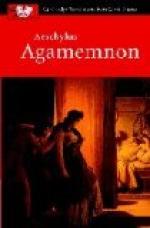If we ask why men are so blind, seeking their welfare thus through incessant evil, Aeschylus will tell us that the cause lies in the infection of old sin, old cruelty. There is no doubt somewhere a [Greek: protarchos hAte ], a “first blind deed of wrong,” but in practice every wrong is the result of another. And the Children of Atreus are steeped to the lips in them. When the prophetess Cassandra, out of her first vague horror at the evil House, begins to grope towards some definite image, first and most haunting comes the sound of the weeping of two little children, murdered long ago, in a feud that was not theirs. From that point, more than any other, the Daemon or Genius of the House—more than its “Luck,” a little less than its Guardian Angel—becomes an Alastor or embodied Curse, a “Red Slayer” which cries ever for peace and cleansing, but can seek them only in the same blind way, through vengeance, and, when that fails, then through more vengeance (p. 69).
This awful conception of a race intent upon its own wrongs, and blindly groping towards the very terror it is trying to avoid, is typified, as it were, in the Cassandra story. That daughter of Priam was beloved by Apollo, who gave her the power of true prophecy. In some way that we know not, she broke her promise to the God; and, since his gift could not be recalled, he added to it the curse that, while she should always foresee and foretell the truth, none should believe her. The Cassandra scene is a creation beyond praise or criticism. The old scholiast speaks of the “pity and amazement” which it causes. The Elders who talk with her wish to believe, they try to understand, they are really convinced of Cassandra’s powers. But the curse is too strong. The special thing which Cassandra tries again and again to say always eludes them, and they can raise no finger to prevent the disaster happening. And when it does happen they are, as they have described themselves, weak and very old, “dreams wandering in the daylight.”
The characters of this play seem, in a sense, to arise out of the theme and consequently to have, amid all their dramatic solidity, a further significance which is almost symbolic. Cassandra is, as it were, the incarnation of that knowledge which Herodotus describes as the crown of sorrow, the knowledge which sees and warns and cannot help (Hdt. ix. 16). Agamemnon himself, the King of Kings, triumphant and doomed, is a symbol of pride and the fall of pride. We must not think of him as bad or specially cruel. The watchman loved him (ll. 34 f.), and the lamentations of the Elders over his death have a note of personal affection (pp. 66 ff.). But I suspect that Aeschylus, a believer in the mystic meaning of names, took the name Agamemnon to be a warning that [Greek: Aga mimnei], “the unseen Wrath abides.” Aga, of course, is not exactly wrath; it is more like Nemesis, the feeling that something is [Greek: agan], “too much,” the condemnation of Hubris (pride or overgrowth) and of all things that are in excess. Aga is sometimes called “the jealousy of God,” but such a translation is not happy. It is not the jealousy, nor even the indignation, of a personal God, but the profound repudiation and reversal of Hubris which is the very law of the Cosmos. Through all the triumph of the conqueror, this Aga abides.




